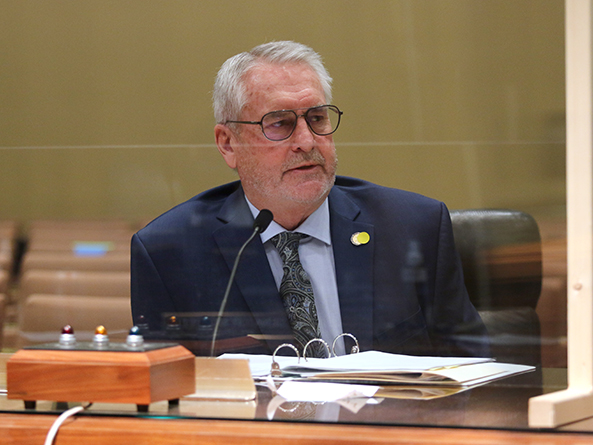Bill would authorize teachers to use physical intervention
The Education Committee heard testimony Feb. 9 on a bill that would require school districts to provide behavioral awareness training to teachers and certain other school staff.

LB673, introduced by Sen. Dave Murman of Glenvil, also would authorize teachers and other school personnel to use reasonable physical intervention to manage student behavior to protect the student or another person from physical injury.
The bill would require each school district to offer annual behavioral awareness and intervention training to teachers, administrators, paraprofessionals, school nurses and counselors beginning with the 2021-22 school year.
Those staff members would receive the training before the end of school year 2023-24 and receive a review at least once every three years.
Under LB673, Murman said, all school employees would have basic training in how to manage dangerous student behavior reasonably and safely.
The required training would include:
- recognition of detrimental factors impacting student behavior, including trauma;
- positive behavior support and proactive teaching strategies;
- verbal intervention and de-escalation techniques;
- clear guidelines on removing students from and returning them to a class;
- behavioral interventions and supports following student removal from a class; and
- physical intervention for safety.
Districts would receive a base training reimbursement of $2,000 for each school building with grades above kindergarten. Schools with 80 or more full-time teachers would qualify for additional reimbursement.
In addition, LB673 would require each district to designate at least one employee as a behavioral awareness and intervention point of contact for each school building. Districts would have to maintain or have access to an existing registry of local mental health and counseling resources, and each point of contact would coordinate student access to those services whenever possible.
The bill also would require school districts to have a policy that describes the process of removing a student from a class and returning a student to a class.
Under LB673, teachers or other school personnel would not be subject to professional or administrative discipline or be held criminally or civilly liable for physical intervention or removal of a student from a class if they acted in a reasonable manner and in accordance with school policy.
Those protections would not be made contingent on whether a school employee has completed behavioral awareness and intervention training.
Mark Bonkiewicz of Omaha testified in support of the bill, saying disruptive students can interrupt lessons and endanger their classmates.
“Without proper decorum and discipline in a classroom,” he said, “the teaching environment is replaced with chaos.”
Kristen Larsen testified in opposition to LB673 on behalf of the Nebraska Council on Developmental Disabilities. Although the bill would address the need for behavioral awareness training, she said, it fails to recognize research showing that students of color and those with intellectual and developmental disabilities experience a much higher rate of physical intervention, discipline and removal from the classroom than their peers.
“While we understand the need for teachers and administrators to maintain control [on] school property and to keep all students and faculty safe,” Larsen said, “we cannot condone the use of physical intervention to manage student behavior.”
Brad Meurrens, public policy director for Disability Rights Nebraska, also testified in opposition. Nebraska schools already are required to have restraint and seclusion policies, he said, but they vary from district to district.
Meurrens said the Legislature should work with schools, families and disability advocates to make those policies uniform and ensure that they focus on preventing dangerous behavior rather than controlling it with physical intervention.
“We don’t need to reinvent the wheel,” he said. “We need to bolster and improve the existing policies that schools already have.”
Also in opposition was Rose Godinez of the ACLU of Nebraska. She said state law already authorizes teachers to take actions that are reasonably necessary to help a student, further school purposes or prevent interference with the educational process.
A Nebraska Supreme Court case determined that the law authorizes teachers and administrators to use physical contact short of corporal punishment to the degree necessary to preserve order and control in the school environment, Godinez said.
The committee took no immediate action on the bill.


